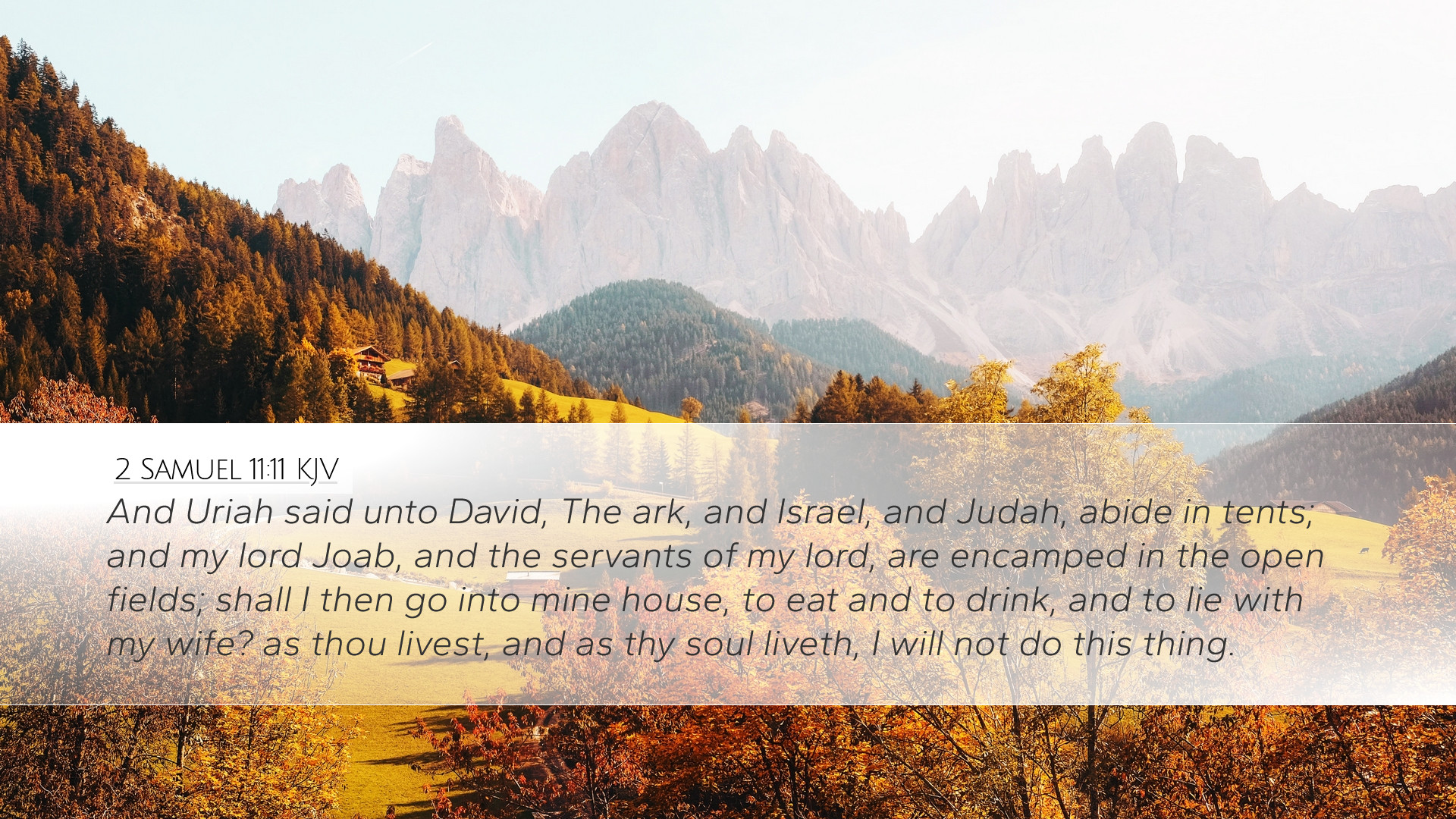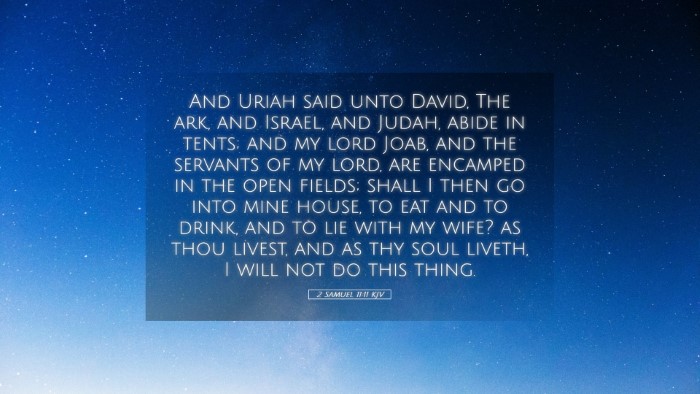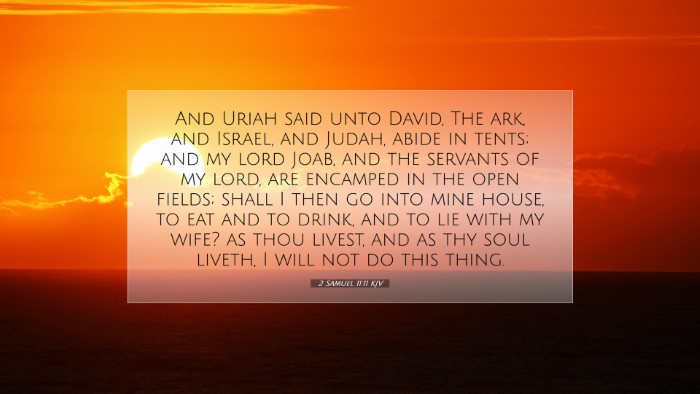Commentary on 2 Samuel 11:11
Text of the Verse: "And Uriah said unto David, The ark, and Israel, and Judah, abide in tents; and my lord Joab, and the servants of my lord, are encamped in the open fields: shall I then go into my house, to eat and to drink, and to lie with my wife? as thou livest, and as thy soul liveth, I will not do this thing."
Introduction
This verse captures a pivotal moment in the narrative of King David's moral failure involving Bathsheba and Uriah. Uriah’s response to David's command reflects his loyalty and valor, serving as a stark contrast to David's own actions. This commentary synthesizes insights from prominent public domain commentators, namely Matthew Henry, Albert Barnes, and Adam Clarke, to deepen the understanding of this text.
Contextual Background
Uriah the Hittite is a key character in this passage, representing the rights of soldiers who were sacrificing their comfort for King David's battles. This verse occurs during a time when David had stayed behind in Jerusalem while his army was engaged in warfare. The Ark of the Covenant, which symbolized God's presence, was also in the field with the soldiers, affirming the seriousness of their plight. The verse reveals Uriah’s strong sense of duty and integrity amidst David's cunning schemes.
Analysis of Uriah's Response
Uriah’s reply to David is multi-faceted, reflecting his commitment to both his king and his comrades:
- Loyalty to His Men: Uriah emphasizes the predicament of his fellow soldiers who are encamped and uncomfortable. His refusal to enjoy personal comforts during a time of war speaks to a commendable sense of duty that many commentators highlight.
- Respect for the Ark: The mention of the Ark signifies Uriah's awareness of God's presence and the spiritual implications of his actions. He indicates that he cannot partake in pleasures while the Ark and the armies of Israel are in jeopardy.
- Honoring His Marriage: Uriah’s reference to lying with his wife points to the sanctity of marriage vows. His unwillingness to break this vow while others suffer illustrates a moral integrity that contrasts sharply with David's intentions.
Commentary Insights
Matthew Henry’s Perspective
Matthew Henry brings out the tragic irony in this situation; here is a man whose loyalty and righteousness, highlighted in his response, protects David’s kingdom, yet he is unsuspectingly caught in a web of deceit. Henry reflects on the moral state of David at this time, suggesting that the king's actions betray the very values he once upheld. Uriah's dedication stands as a moral beacon against David's faltering character.
Albert Barnes’ Reflections
Barnes emphasizes the significance of Uriah’s character and the moral lesson inherent in his response. He points to how Uriah’s integrity reveals a deeper concern for communal well-being over personal gratification. Barnes further comments on the implications of leadership, suggesting that David's failure not only impacts himself but also creates a ripple effect affecting Uriah, Bathsheba, and Israel. The implication is that the purity of intention must remain at the forefront of one's decisions, especially for leaders.
Adam Clarke’s Observations
Adam Clarke offers an extensive exploration of the cultural and societal context. He highlights the military customs of the time that uphold the soldiers’ commitment to their tasks; hence, Uriah's question is not merely rhetorical but a reflection of entrenched values among the Israelite soldiers. Clarke notes Uriah's piety and the understanding of divine principles regarding war and conduct, thus pointing out that Uriah's honor surpasses that of David's actions and intentions at this point.
Theological Implications
This narrative compels a deep reflection on the nature of leadership and morality. The contrast between David's actions and Uriah’s response raises foundational questions about integrity, the influence of power, and ethical decision-making.
- Moral Compass: Uriah serves as a touchstone of virtue, inviting reflection on the ethics of leaders. The repercussions of David's moral decline illustrate the potential devastation that ensues when leaders operate outside the bounds of righteousness.
- Consequences of Sin: The larger narrative arc reveals how David's sin leads to severe consequences, not only for himself but also for Uriah, Bathsheba, and countless others. The gravity of ethical failures in positions of authority is underscored.
- God’s Presence and Integrity: The mention of the Ark represents God's watchfulness over human affairs, reiterating that one's personal choices are never isolated from their impacts on community and one’s relationship with God.
Conclusion
2 Samuel 11:11 serves as a critical juncture in understanding the dynamics of leadership, morality, and human integrity. The response of Uriah encapsulates themes of loyalty, duty, and the struggle against personal indulgence amidst communal suffering. The insights of Matthew Henry, Albert Barnes, and Adam Clarke deepen our understanding of not only the narrative but also the theological implications that reverberate through history, challenging every leader to reflect on the moral weight of their decisions.


